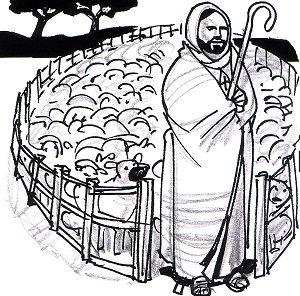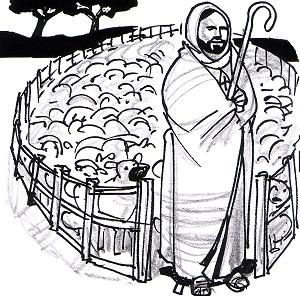

“I am the good shepherd” (John 10:11).
Fourth Sunday of Easter
Acts 4:8-12; Psalm 118; 1 John 3:1-2; John 10:11-18
The image of God as shepherd is central to the Bible, found in Ezekiel as a rebuke against leaders who did not care for the flock, as comfort and protection in Psalm 23, and as the rich symbol of Jesus’ role as humble servant leader who lays down his life to save us. Shepherds were the first witnesses to the birth of Jesus, a striking pastoral reminder that the Good News came first to the poorest of the poor, shepherds being the least of essential workers, malodorous vagabonds tending flocks under the stars in the grassy highlands, shunned and mistrusted in the villages. Jesus began his life of downward mobility in their company and ended it as a nuisance to power, crucified between thieves after his final Passover lesson to his disciples as a foot-washing slave.
Jesus the Good Shepherd is the model for leadership the bishops had before them in Dallas in 2002 when they met to face the child abuse crisis that has threatened the very identity of the church. Jesus is the shepherd in search of lost sheep that Pope Francis has invoked to tell his brother bishops to bring a self-referential and power-centered church to the margins as field hospital instead of juridical gatekeeper. Jesus is the victim of human sin as the Lamb of God, silent before the shearer, innocent and vulnerable, our self-emptying Lord leading us in exodus through the valley of death to the banquet of life.
Today’s readings also present Jesus as the rejected stone that became the cornerstone to stabilize a faltering institution and the rock of the papacy that holds firm the apostolic succession. Jesus predicted the weakness of his followers at the Last Supper when he said that they would scatter like sheep when the shepherd was struck. Peter, who denied his Master, reconvened them on the even deeper foundation of divine mercy. The mission of the church is forgiveness and reconciliation. The Apostles finally understood this when Jesus breathed new life into them and sent them forth to find the lost sheep.
The author of 1 John reminds us that to follow Jesus we must become like him. We learn meekness and gentleness of heart by listening to his voice, the ever-present Holy Spirit who forms us with the mind and heart of Jesus. To know his voice before all others, including our own, is to live as servants, our true selves, children of God, a new creation in the shell of the old, which is passing away.
The Good Shepherd was also the gate of the enclosure, guarding it with his own body to prevent predators from entering the flock. The Gospel anticipated the diversity of churches that will some day become one when Jesus unites them. Good Shepherd Sunday calls us not to be sheep but to be shepherds. All those who teach, parent, heal, nourish, pastor, guide, serve and protect are good shepherds, and we honor them today.
Advertisement




